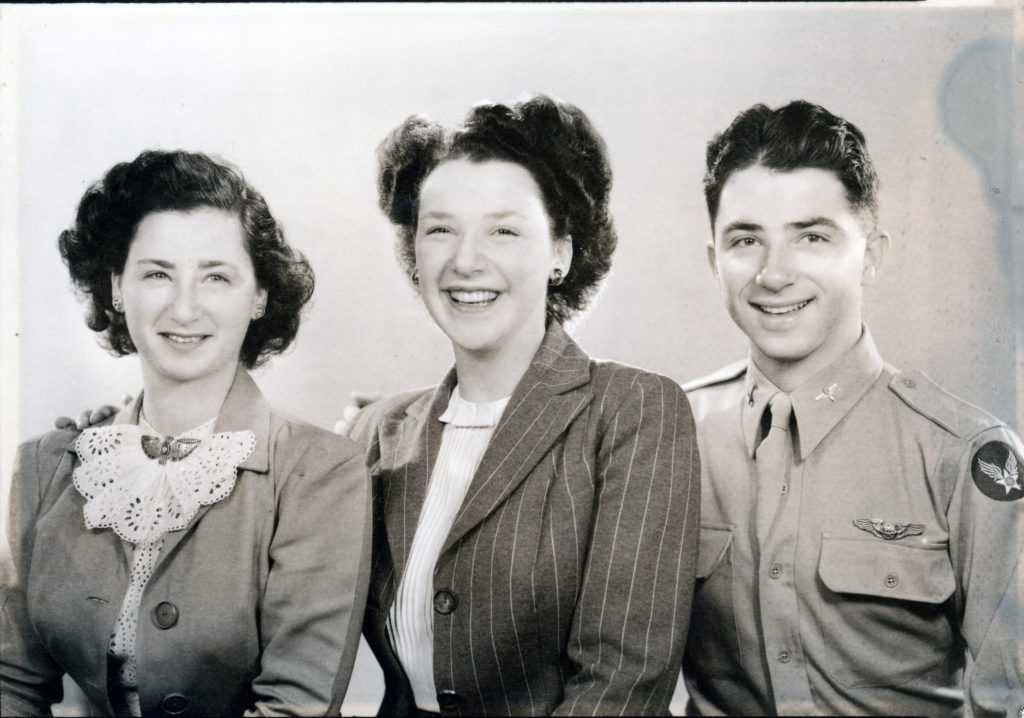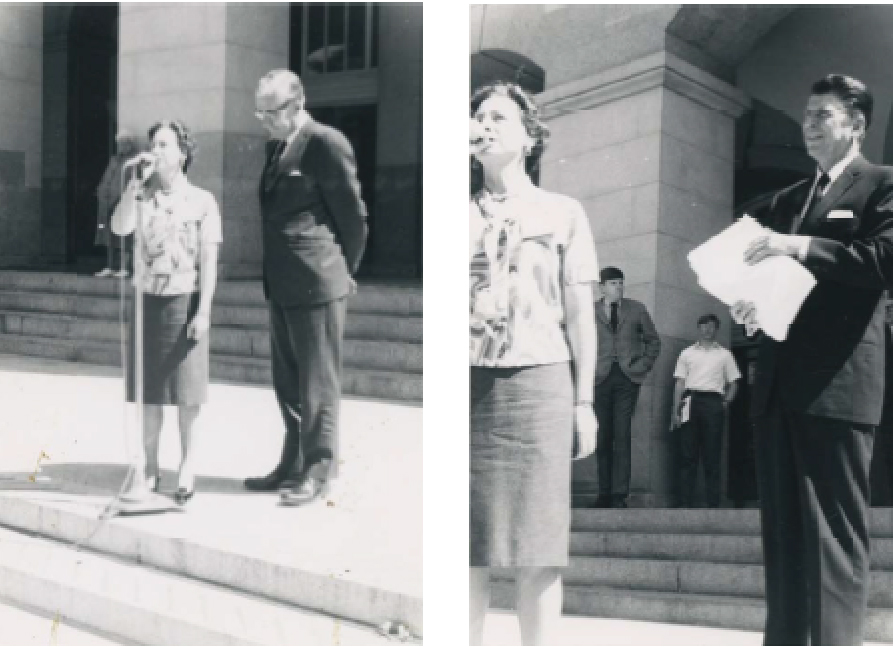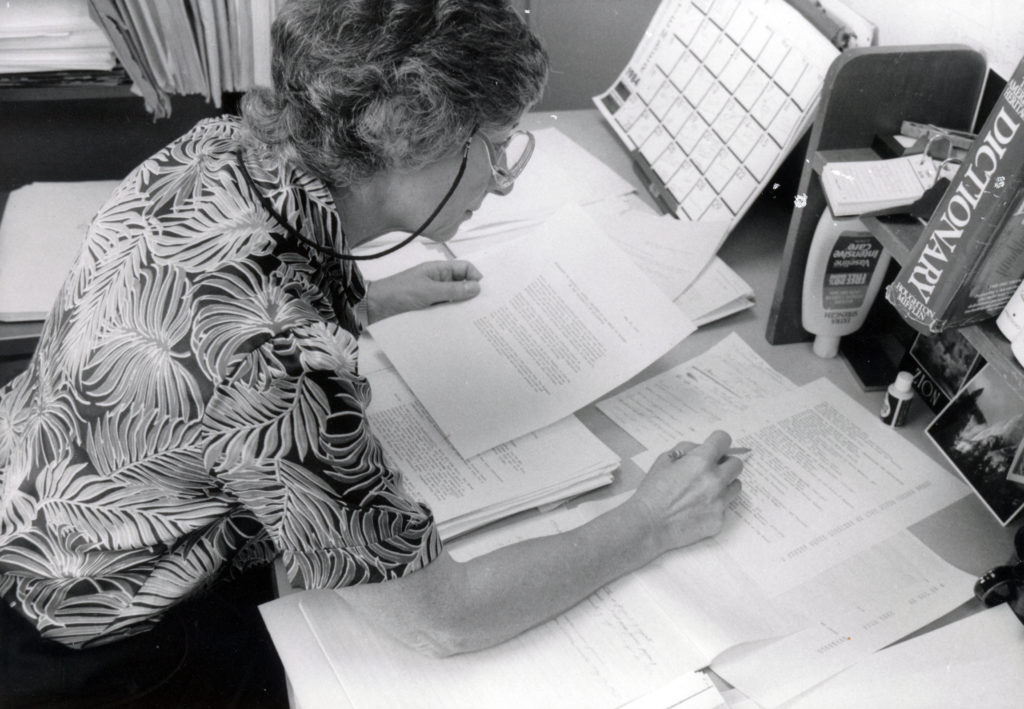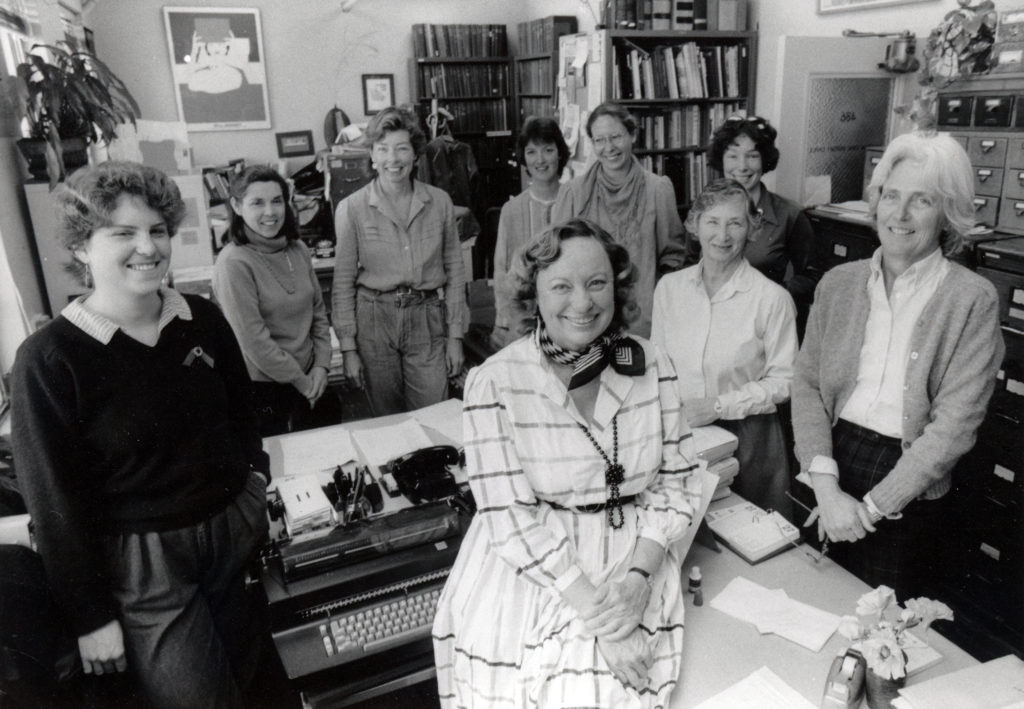
by Ann Lage
We are delighted to introduce the oral history of our former colleague, Malca Chall: Wage Rate Analyst for the War Labor Board, World War II; East Bay Community Activist; Interviewer/Editor for the Regional Oral History Office, 1967-2000.
Malca is well known in the Oral History Center as a key staff member for thirty-three years. She came to the Regional Oral History Office, as we were then named, in 1967 and soon became an indispensable and respected interviewer, project director, and right-hand woman to director Willa Baum. Over the years she planned and carried out an impressive array of oral histories, most prominently in the fields of California water policy and politics and government. Her final volume of interviews was completed in 2000.
Few of Malca’s colleagues were aware of an earlier chapter in her life: her employment with the National War Labor Board in Seattle during World War II. Once we learned of her work as a wage rate analyst in the Seattle area for the War Labor Board, we realized that her story would add a unique perspective to our Rosie the Riveter / World War II American Home Front Project. Recognizing an opportunity to also document some important history of the Regional Oral History Office, where I was her colleague for many years, I offered to record Malca’s wartime experiences as the first topic in a longer oral history encompassing her career with ROHO. Only after meeting with Malca to plan her oral history did I realize the importance of also discussing her extensive civic activism in the Hayward/Castro Valley area. In many ways, her volunteer activities with the League of Women Voters and other citizen groups, as well as her wartime experiences, informed her pursuits as an interviewer and project director at ROHO.
Malca Kleiner Chall was born in 1920 in Tacoma, Washington, to a family active in business, in civic affairs, and in the Jewish community. Malca graduated from Reed College and received a master’s degree in political science at the University of Iowa.

Photo taken for parents’ 25th wedding anniversary, 1944
In 1943, she accepted an offer from George Bernard Noble, her major professor at Reed who had been appointed head of the War Labor Board, Twelfth Region, to join his staff in Seattle. At age twenty-three, with minimal formal training, she stepped into the ticklish job of analyzing requests for wage increases from both labor and industry, as the WLB sought to dampen inflationary pressures in the midst of critical labor shortages. She visited potato fields, apple orchards, and fisheries, as well as banks, aluminum factories, shipping companies, and other work sites, conducting research and making determinations on acceptable wage rates.
In the oral history Malca reflects on the impact of her wartime employment and also discusses social and political life in wartime Seattle for a young professional woman. An amusing highlight of this section is her account of a bike trip with a friend and colleague, during which the two young women spent a night in a jail cell, arranged by the police of Everett, Washington, when the friends found themselves without a safe place to sleep.
Following the war, Malca moved to New York in search of a job in labor relations. She found work instead with the Edward Bernays public relations firm and in time met and married her husband, Harold Chall. After they moved west to California, settling south of Oakland in San Leandro and then Hayward and Castro Valley, Malca launched her second career as a civic activist, or as she puts it, “a pioneer of controversy in the community.” She worked for the Community Welfare Council in Oakland until the birth of the first of her two sons, David and Barry. As a young mother, she joined the League of Women Voters and was soon a leader in its Eden Unit, spearheading a study of the Hayward city government and helping to draft and secure voter approval for substantial charter revisions. She was active in campaigns for local political figures, including March Fong Eu’s election to the State Assembly as the second woman and first Asian American in the California legislature. She was also prominent in numerous battles to counter right-wing-John Birch Society-McCarthyite pressures in the Hayward area and to secure increased funding for local schools.

In the second photo, Reagan appears.
In 1967, Malca was hired by Willa Baum, long-time director of the Regional Oral History Office. Her background in political issues and personal relationships with East Bay women who had entered the arena of local and statewide government soon led to the development of one of ROHO’s earliest major projects, California Women Political Leaders, focusing on elected officials, political party officers, and community leaders from 1920 to 1970. She documented an era where women in elected offices at the state and federal levels were few and far between, demonstrating how they had nevertheless long been active, if often behind the scenes, in governance of political parties and community organizations, in local government and on school boards. She helped secure project funding for the Women Political Leaders project from multiple sources, including the National Endowment for the Humanities and the Rockefeller Foundation, honing an essential survival skill in an office that was funded almost solely by grants and gifts. Malca directed the Women Political Leaders project and was eventually tapped to conduct interviews in a variety of other subject areas, from banking to education to health care, even as she became the primary interviewer on California water policy for many years. Her wide-ranging work on water—from sanitary engineers to the founders of Save-the-Bay, from Governor Pat Brown and state water resource managers to the architects of the historic federal Central Valley Project Improvement Act—has made the Oral History Center’s collection an essential source for researchers on California water issues.

Willa Baum soon recognized Malca’s organizational skills, work ethic, and attention to detail and enlisted her for key tasks in office management. In the oral history, Malca describes preparing style and indexing guidelines for her projects, which became templates for many others. She researched average times to complete each aspect of the oral history process, an essential budgeting tool. Most impressive was the multi-paged comprehensive production manual, outlining each task in the oral history process, whose responsibility it was, and in which file drawer each stage of the evolving transcript should be placed, an essential document for an office primarily staffed by a shifting array of part-time workers, as many as thirty people sharing desks in a four-room space. Malca also discusses her contributions to outreach, including performing with Amelia Fry in a play based on ROHO’s interviews with suffragists. Throughout the oral history she recalls many of the ROHO women (almost all staff members were women), and the leadership qualities of Willa Baum, as well as friendships, fun, and challenges of her three-decade career with the Regional Oral History Office.

Left to right, Nora Cody, Ann Lage, Suzanne Riess, Elizabeth Eshleman, Laurie Dunlap, Malca Chall, Julie Shearer, Gaby Morris. In front, Willa Baum
From January to May 2015, Malca and I met for seven sessions at her Hayward home to record her oral history. After receiving the lightly edited transcript, she undertook her characteristically careful review, did further research to check her facts, and added in names or details she had overlooked. She did not edit her words beyond a few clarifying changes. As we finished the review, Malca was packing up her house for a move to a retirement community nearby. Ever the careful historian, as she sifted through files she gathered historically significant papers and placed them with the Hayward Area Historical Society or the Bancroft Library, as appropriate. Her research files relating to water issues went to the Water Resources Center Archives (now the Water Resources Collections and Archives at UC Riverside) when she retired from ROHO.
Nearly all of the oral histories Malca Chall conducted during her ROHO career are available on line through the Oral History Center website, where also can be found the oral history with former director Willa K. Baum, conducted in part by Malca Chall. The Oral History Center is a division of the Bancroft Library and is under the direction of Martin Meeker. Special thanks are due to David Dunham who directs the World War II American Home Front project; he first tapped Malca as a Rosie interviewee and has shepherded this oral history throughout the process.
Ann Lage
Interviewer Emeritus
Berkeley, California
July 2017